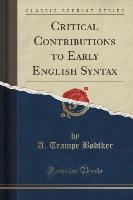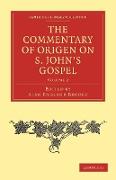Critical Contributions to Early English Syntax (Classic Reprint)
BücherAngebote / Angebote:
Excerpt from Critical Contributions to Early English Syntax
The much debated question of French influence on English Syntax is not likely to be definitely settled. At the time of the Invasion, Anglo-Saxon was already in a state of rapid evolution. From the greater and more interesting part of the eleventh and twelfth centuries we possess only few and insufficient linguistic documents, our knowledge of Old English is limited. Many apparently new phenomena may also be due to similar constructions in Latin or Scandinavian.
We cannot tell when French syntactical influence began, and have no means of measuring its strength. In some cases it may have been paramount, in others, altogether secondary, but exact proofs cannot be given. Special investigations like those of for (Stoffel) and the Absolute Participle in Middle English (Ross) show the difficulty of positive statements. One scholar asserts French influence as probable where another finds it only possible, or perhaps denies it. According to Einenkel, a large portion of the English Syntax is due to French, while Jespersen, in his 'Growth and Structure of the English Language', passes over the delicate question in significant silence.
I have here - in chapters of very unequal length and plan - tried to show how new constructions may have arisen on native soil, favoured or not by foreign influence. Einenkel's 'Syntax' in Kluge's Geschichte der englischen Sprache (Grundriss der germanischen Philologie I, pp. 1071 - 1151) offers a convenient starting point in a great many cases. When I leave different assertions of French influence unnoticed, it is not to imply that I subscribe to all of them, but in the absence of new facts there is no need of entering into a discussion of the matter.
French idiom did not only enrich the Vocabulary, it also left considerable traces in English Phraseology.
About the Publisher
Forgotten Books publishes hundreds of thousands of rare and classic books. Find more at www.forgottenbooks.com
This book is a reproduction of an important historical work. Forgotten Books uses state-of-the-art technology to digitally reconstruct the work, preserving the original format whilst repairing imperfections present in the aged copy. In rare cases, an imperfection in the original, such as a blemish or missing page, may be replicated in our edition. We do, however, repair the vast majority of imperfections successfully, any imperfections that remain are intentionally left to preserve the state of such historical works.
Folgt in ca. 5 Arbeitstagen




